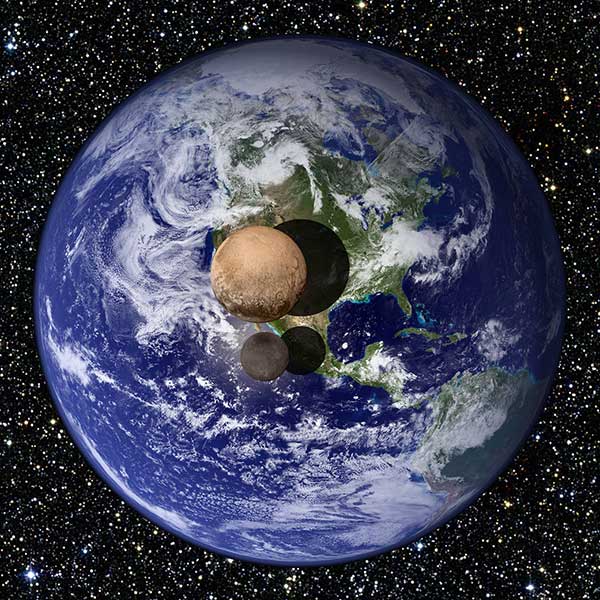ABC 7 News/KGO TV Bay Area, 9/10/15, includes video 1:01 minutes. "NASA releases new images of Pluto."
 |
| Earth to Pluto (and moons) size comparison (not a real planet) |
The craft launched in 2006 and took more than nine years to reach Pluto.This is one last look back at Pluto's darkside as the spacecraft jetted off into a distant part of our solar system. New Horizons is currently 43 million miles past Pluto."
Related, news. ABC 7 News Bay Area/Science/Associated Press/LA Blake, 7/15/15, .... "The pictures showed ice mountains on Pluto about as high as the Rockies
and chasms on its big moon Charon that appear six times deeper than the
Grand Canyon. Scientists said the peaks appeared to be a mere 100 million years old. Pluto itself is 4.5 billion years old. .... The $720 million mission makes the United States the only country in
the world to visit every planet in the solar system, including Pluto,
which has been demoted from "planet" status since New Horizons took off."
Related, NASA science detail. Mirror news UK/Jeff Parsons, 7/24/15, includes video 3:46 minutes,
(turn up sound). "NASA's stunning new Pluto images show atmospheric haze and glaciers on the dwarf planet."
Related, background. The Altantic/Alan Taylor, 7/13/15. "The voyage of New Horizons: Jupiter, Pluto, and Beyond." "After traveling nearly 3 billion miles over the past nine and a half
years, NASA’s New Horizons spacecraft is within hours of its rendezvous
with Pluto. Back in 2006, when the space probe was launched, Pluto was
classified as the ninth planet in the solar system, and was known to
have three moons. During the long journey to this distant icy world,
Pluto was reclassified as a dwarf planet, one of many smaller bodies
orbiting the sun, and another two moons were discovered. In 2007, New
Horizons flew past Jupiter and its moons on the way to Pluto, capturing
many spectacular images. On the morning of July 14, 2015 (Earth time,
Western Hemisphere), New Horizons will speed past the Pluto system at about 9 miles
(14 kilometers) per second, making as many observations as possible. .."
Note photograph/graphic from the related ABC 7 article. "New
Horizons has measured Pluto and its largest moon, Charon, and NASA
created this image to demonstrate how big they are compared to Earth. (NASA)."
Posted by Kathy Meeh


1 comment:
And NIMBIES would reclassify Pacifica "not a city", due to the "dwarf economy" they caused.
Post a Comment